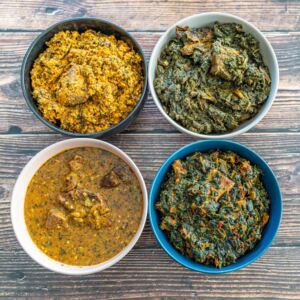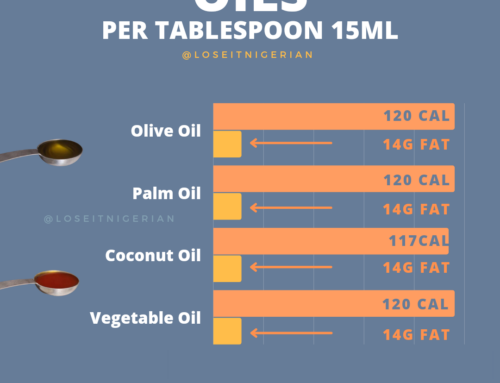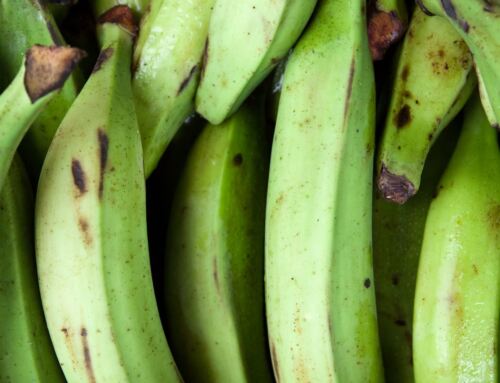Choosing the Best Nigerian Carbohydrates
The typical Nigerian diet contains a variety of carbohydrates. For example, rice, yam, cassava, beans, agbalumo, and pawpaw.
Eating a diet rich in carbohydrates is an aspect of Naija culture.
Despite what you may hear in the media, carbohydrate foods do not need to be avoided to be healthy.
However, understanding carbohydrates is crucial if we want to live healthy lives.
We all require carbohydrates to provide energy for bodily functions and physical activities. On the other hand, certain types of carbohydrates can contribute to the development of obesity and diabetes.
This article aims to increase your understanding of carbohydrates and how to choose the best carbohydrate foods to maintain a healthy lifestyle.
What Are Carbohydrates?
Carbohydrates are one of three macronutrients in the human diet, alongside protein and fat.
Carbohydrates are the body’s primary source of energy. In fact, the brain only uses carbohydrates as a source of fuel.
Not all carbohydrates are created equal. There are three main groups of carbohydrates: simple sugars, complex carbohydrates, and fibre.
Simple Sugars
Simple sugars are made of just one or two sugar molecules. They are digested quickly and lead to a spike in blood sugar and insulin levels.
Simple sugars are found in sugar-sweetened beverages, candy, chocolate, ice cream, and pastries.
Sugars are not only found in dessert foods, but also naturally in fruit, honey, milk, and maple syrup.

Pastries, ice cream, and chocolate are all sources of simple sugars.
Complex Carbohydrates
Complex carbohydrates are made from at least three sugar molecules that are strung together. Starches are one type of complex carbohydrate.
Since the structures are longer and more complex, they are digested more slowly. Therefore, they provide less of a spike in blood sugar and insulin than simple sugars.
Complex carbohydrates are found in whole grains, beans, cassava, yam, and potatoes.
Fibre
Fibre is a general term for carbohydrates that humans can’t digest. As a result, fibre does not increase blood sugar levels.
In fact, fibre can help reduce the impact of other types of carbohydrates on blood sugar. That is why fruits lead to less of a spike in blood sugar than fruit juice.
Fibre helps to bulk and soften bowel movements and provides food for the bacteria in the gut.
One type of fibre, called soluble fibre, helps to decrease blood cholesterol levels.
Fibre is found in fruits, vegetables, beans, nuts, and whole grains.

Vegetables are a great source of fibre.
Choose Less Processed Carbohydrates
In general, choosing whole, unprocessed carbohydrates is better for your health.
For example, choose whole grains such as oats, Ofada rice, millet, Guinea corn (sorghum), acha (fonio), and whole wheat flour. These products contain more fibre and nutrients than white wheat flour and white rice.
As well, choose whole fruits and vegetables instead of juice. The fibre in whole fruits and vegetables helps to maintain more steady blood sugar levels.
Limit your intake of added sugars, such as in sweet drinks, desserts, and candy. In light of the research, we know that eating too much sugar contributes to weight gain and metabolic diseases (e.g., type 2 diabetes).
Choose Low-Glycemic Index Carbohydrates
The glycemic index (GI) is a tool for demonstrating how much food raises blood sugar levels.
The GI scale gives foods a number out of 100, where 100 means that the food raises blood sugar as much as pure glucose.
In like manner, the higher the GI, the more your blood sugar is raised after eating the food.
Below are the generally accepted cut-off values for GI:
- Low GI ≤55
- Medium GI 56-69
- High GI ≥70
Researchers have found that eating low GI foods more often can help you feel full longer. In addition, a diet based on low GI foods can help you lose weight and maintain a healthy weight.
The Best Nigerian Carbohydrates
The best Nigerian carbohydrates are whole, unprocessed or minimally processed grains, starchy vegetables, beans, dairy, and fruits.
Carbohydrate foods that have a low to medium GI include:
- Breakfast foods: Oatmeal, millet porridge, cornmeal porridge
- Grains: Ofada rice, maize, Guinea corn (sorghum), acha (fonio)
- Dairy: Fresh milk, sour milk, unsweetened soy milk, unsweetened yoghurt
- Legumes: Beans
- Starchy vegetables: Green plantain, carrots, sweet potato, yam, cocoyam
- Fruits: Strawberries, blueberries, banana, pineapple, apples, agbalumo (African star apple), guava, graviola (soursop), orange, mango, June plum (African plum), cashew fruit
How Much Carbohydrate Should I Eat a Day?
The current recommendation in the USA and Canada is for all adults to consume a minimum of 130 grams of carbohydrate for brain function. More is needed for certain life stages, such as 175 grams for pregnant women and 210 grams for nursing mothers.
Most people get enough carbohydrate with a typical balanced diet. It is recommended to get about 45-65% of your daily calories from carbohydrates.
In addition, it is recommended to get 14 grams of fibre for every 1,000 calories you consume each day.
That translates to about 25 grams of fibre per day for women and 38 grams per day for men.
Conclusion
Carbohydrate foods are not all created equal. Choosing high-fibre, minimally processed carbohydrate foods is key to a healthy diet.
Swap out white rice and white flour for whole-grain options and eat whole fruits and vegetables more often than juice.
With this in mind, eat a diet based on low-GI carbohydrates to feel satisfied after eating and maintain a healthy body weight.
Are you looking to eat healthier in 2023? Want to lose weight while eating your favourite Nigerian foods? If yes, then reach out to us via WhatsApp or by using our contact form.



Leave A Comment